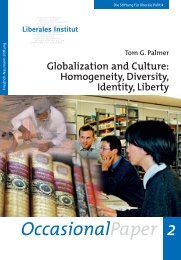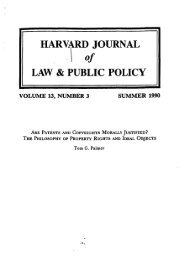G. A. Cohen on Self-Ownership, Property, and ... - Tom G. Palmer
G. A. Cohen on Self-Ownership, Property, and ... - Tom G. Palmer
G. A. Cohen on Self-Ownership, Property, and ... - Tom G. Palmer
You also want an ePaper? Increase the reach of your titles
YUMPU automatically turns print PDFs into web optimized ePapers that Google loves.
246 Critical Review Val. 12, No. 32.3.4.5.6.7.Other recent works that have cited without criticism or have incorporatedat least some of <str<strong>on</strong>g>Cohen</str<strong>on</strong>g>’s basic claims into their critique of several propertyinclude Waldr<strong>on</strong> 1988, Munzer 1990, Ingram 1994, Haworth 1.994, Christ-man 1gg4a <strong>and</strong> ~ggbb, <strong>and</strong> Sreenivasan 1995. <str<strong>on</strong>g>Cohen</str<strong>on</strong>g>’s approach has beencriticized by David Gord<strong>on</strong> (1990) <strong>and</strong> by Jan Narves<strong>on</strong> (~ggo), althoughwithout raising the problems I point out in this critique. Unlike the criticismsof Gord<strong>on</strong> <strong>and</strong> Narves<strong>on</strong>, my rehtati<strong>on</strong> of <str<strong>on</strong>g>Cohen</str<strong>on</strong>g>’s central argumentsis immanent.Part of Weinberg’s claim is that <str<strong>on</strong>g>Cohen</str<strong>on</strong>g>’s critique of libertarian views <strong>on</strong> libertyis a decisive refutati<strong>on</strong> of libertarians’ claims to be defenders of fieedom.I deal with that issue in my separate reply to Friedman in this issue of CriticalReview, in resp<strong>on</strong>se to his claim that “<strong>on</strong>e stipulative definiti<strong>on</strong> is as good asanother” (Friedman 1997,432)~ so I will instead focus my criticism here <strong>on</strong><str<strong>on</strong>g>Cohen</str<strong>on</strong>g>’s critique of “self-ownership,” which Weinberg (1997,324) c<strong>on</strong>sidersto be, if anything, “too sympathetic an analysis of libertarian c<strong>on</strong>cepts.”Weinberg cites in support of this claim a particularly outl<strong>and</strong>ish attack <strong>on</strong><str<strong>on</strong>g>Cohen</str<strong>on</strong>g> by Brian Barry for even bothering to address classical liberalism at all.I :!’(See Barry 1996 <strong>and</strong> <str<strong>on</strong>g>Cohen</str<strong>on</strong>g>’s resp<strong>on</strong>se [1gg6].)<str<strong>on</strong>g>Cohen</str<strong>on</strong>g> quite oddly proceeds to define each pers<strong>on</strong>’s property in herself interms of its very negati<strong>on</strong>, viz., “According to the thesis of self-ownership,each pers<strong>on</strong> possesses over himself, as a matter of moral right, all those rightsthat a slaveholder has over a complete chattel slave as a matter of legal right,<strong>and</strong> he is entitled, morally speaking, to dispose over himself in the way that aslaveholder is entitled, legally speaking, to dispose over his slave” (68). This isa strange way of underst<strong>and</strong>ing “selCownership,” <strong>on</strong>e that would not gener- :ally be endorsed by defenders of property in <strong>on</strong>e’s pers<strong>on</strong>, but which hasbeen taken up as paradigmatic by many who have recently followed in<str<strong>on</strong>g>Cohen</str<strong>on</strong>g>’s footsteps. The possibility of the inalienability of certain rights is aclear case in which the (illegitimate) property claimed by a slaveholder in herslaves is misleading, rather than illuminating, as a paradigm of property in<strong>on</strong>e’s pers<strong>on</strong>, Although misleading in other respects, the definiti<strong>on</strong> need notbe disputed to show that <str<strong>on</strong>g>Cohen</str<strong>on</strong>g>’s c<strong>on</strong>clusi<strong>on</strong>s do not follow from hispremises.See for a correcti<strong>on</strong> Gord<strong>on</strong> 1990, 78-80. Gord<strong>on</strong> (1990. 83) also takes<str<strong>on</strong>g>Cohen</str<strong>on</strong>g> to task for “seizing <strong>on</strong> the exact words while ignoring their sense” inmisunderst<strong>and</strong>ing Nozick‘s point c<strong>on</strong>cerning redistributi<strong>on</strong> of wealth gainedunder a determinate system of rights-namely, that “things come into theworJd already attached to people having entitlements over them” (Nozick1974, x6o)as a claim about inifid appropriati<strong>on</strong>.<str<strong>on</strong>g>Cohen</str<strong>on</strong>g> is dem<strong>and</strong>ing, in effect, that it be shown not merely that appropriati<strong>on</strong>may be permissible, but that it must be optimal as well. See the discussi<strong>on</strong>of the two kinds ofjustificati<strong>on</strong> in Simm<strong>on</strong>s 1994.It is worth noting that even “indivisible” goods can be divided <strong>on</strong> the basisof agreement, <strong>and</strong> quite comm<strong>on</strong>ly are. H. Peyt<strong>on</strong> Young describes “eightfI.:.$:g.*g?%i$@.$gi,











